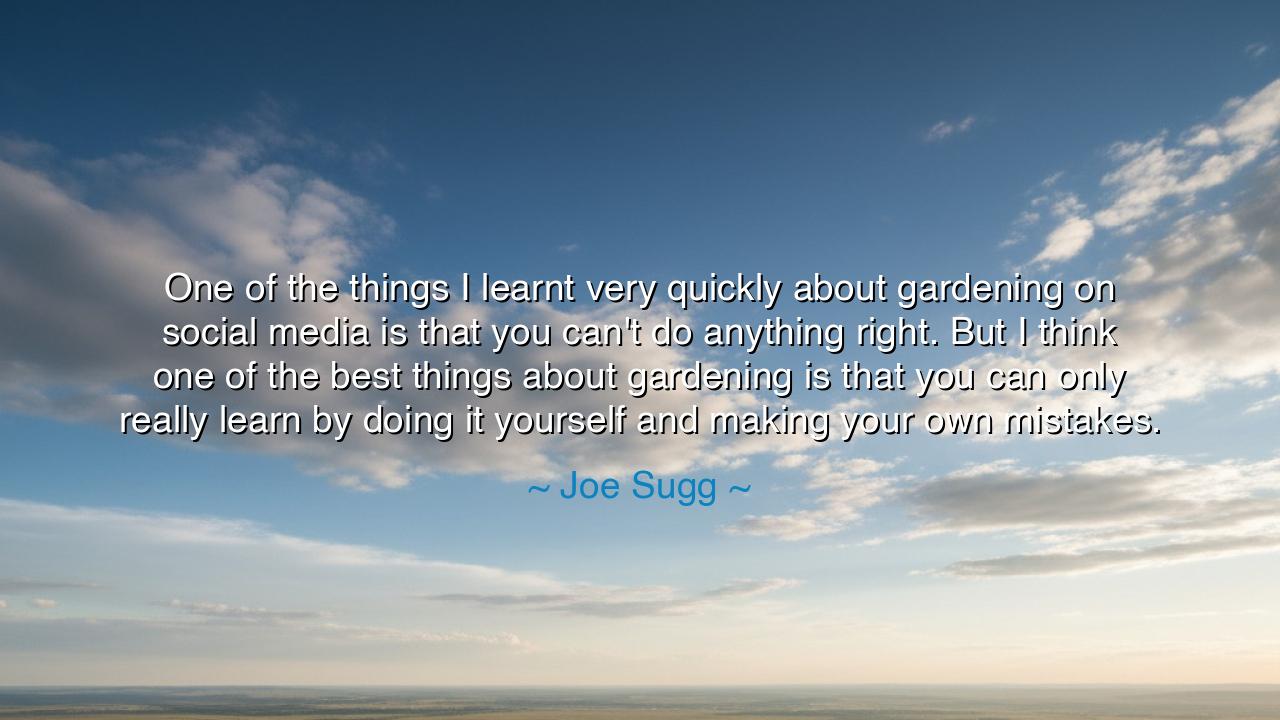
One of the things I learnt very quickly about gardening on social
One of the things I learnt very quickly about gardening on social media is that you can't do anything right. But I think one of the best things about gardening is that you can only really learn by doing it yourself and making your own mistakes.






Hear, O children of wisdom, the words of Joe Sugg, who speaks of the humbling yet powerful lessons of gardening in a world that often looks for perfection in the realm of nature. He says: "One of the things I learnt very quickly about gardening on social media is that you can't do anything right. But I think one of the best things about gardening is that you can only really learn by doing it yourself and making your own mistakes." These words strike at the heart of the human condition—our desire for perfection, our need for approval, and our search for mastery. But Sugg's insight reveals that true growth—whether in gardening, in life, or in wisdom—comes not through external validation, but through personal experience, trial, and the courage to make mistakes.
In the ancient wisdom of the Greek philosophers, particularly Socrates, there was a profound recognition that learning is not a passive act, but a process of engagement and trial. Socrates famously said, “The only true wisdom is in knowing you know nothing.” His teaching was grounded in the idea that wisdom comes not from avoiding mistakes, but from embracing them as part of the journey to understanding. Similarly, the Stoics taught that true virtue and growth could only arise from accepting life's challenges and learning from them, not by seeking to avoid failure. Joe Sugg’s words echo this ancient wisdom—to learn gardening, as in life, is to embrace imperfection, to make mistakes, and to use those mistakes as stepping stones toward mastery.
Consider the ancient art of farming, where the process of growing food was not just about planting seeds and watching them grow, but about experimentation, patience, and learning through experience. The Romans, known for their advanced agricultural practices, did not simply rely on established methods handed down through tradition. They studied the land, observed the seasons, and learned from their own successes and failures. They understood that agriculture, like all things, was a living process—subject to the whims of weather, soil, and unseen forces—and that true mastery came only through experience and adaptation. This process of trial and error is a fundamental truth of life—only by experiencing and experimenting do we truly grow and understand.
This wisdom is also illustrated in the life of Thomas Edison, whose journey to invent the light bulb was marked by countless failures and mistakes. Edison famously said, "I have not failed. I've just found 10,000 ways that won't work." His success was not born of a flawless path, but of a relentless pursuit of knowledge through trial, error, and a refusal to be discouraged by mistakes. Like a gardener who learns not only from the growth of plants but also from the wilting of leaves or the decay of a crop, Edison understood that failure is an inevitable and necessary part of discovery. Sugg’s wisdom, too, is rooted in this understanding—that gardening, like all learning, is about engagement with the world, experimentation, and the willingness to make mistakes and learn from them.
The lesson here, O children of wisdom, is one of humility and resilience. Gardening, in its purest form, teaches us that we cannot control everything, but we can learn through our actions, our trials, and our failures. This is not a world where perfection is attainable through external validation, but one where true growth comes from within—from embracing the natural rhythm of life and working with it, not against it. Sugg’s words call us to engage deeply with the world around us, to take risks, to try new things, and to accept that mistakes are simply part of the process of becoming who we are meant to be. In gardening, as in life, we cultivate through care and attention, through trial and error, through the constant willingness to learn and grow.
So, what must we do with this wisdom, O children of the divine? We must embrace the process of learning. Whether we are tending a garden or pursuing any other craft, let us not seek perfection, but growth through action. Let us be willing to fail, for in those failures lie the seeds of our greatest learning. Let us approach life not with a desire for approval or to escape difficulty, but with the knowledge that it is through struggle and imperfection that we are shaped into who we are meant to be. In doing so, we grow wiser, stronger, and more deeply connected to the divine flow of life.
Gardening teaches us the art of patience, the importance of perseverance, and the value of learning by doing. May we all walk this path, knowing that we are not meant to be perfect, but to be engaged, to learn, to experiment, and to grow. Every mistake is a lesson, and every failure is a stepping stone toward greater understanding. Let us take these teachings into our hearts and live with courage, knowing that the path to wisdom is built on the willingness to make mistakes and to learn from them.






AAdministratorAdministrator
Welcome, honored guests. Please leave a comment, we will respond soon